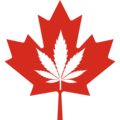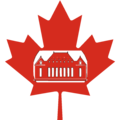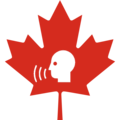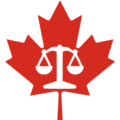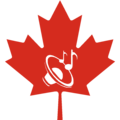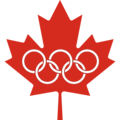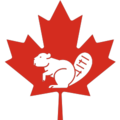Portal:Canada
| Showcase | Contents | Contributing |
Introduction
Canada is a country in North America. Its ten provinces and three territories extend from the Atlantic Ocean to the Pacific Ocean and northward into the Arctic Ocean, making it the world's second-largest country by total area, with the world's longest coastline. Its border with the United States is the world's longest international land border. The country is characterized by a wide range of both meteorologic and geological regions. With a population of just over 41 million people, it has widely varying population densities, with the majority residing in urban areas and large areas of the country being sparsely populated. Canada's capital is Ottawa and its three largest metropolitan areas are Toronto, Montreal, and Vancouver.
A developed country, Canada has a high nominal per capita income globally and its advanced economy ranks among the largest in the world by nominal GDP, relying chiefly upon its abundant natural resources and well-developed international trade networks. Recognized as a middle power, Canada's support for multilateralism and internationalism has been closely related to its foreign relations policies of peacekeeping and aid for developing countries. Canada promotes its domestically shared values through participation in multiple international organizations and forums. (Full article...)
Featured article -
The École Polytechnique massacre (French: tuerie de l'École polytechnique), also known as the Montreal massacre, was an antifeminist mass shooting that occurred on December 6, 1989, at the École Polytechnique de Montréal in Montreal, Quebec, Canada. Fourteen women were murdered; another ten women and four men were injured.
The perpetrator was 25-year-old Marc Lépine, armed with a legally obtained Ruger Mini-14, 30-round high-capacity magazines, and a hunting knife. He began his rampage at a mechanical engineering class at the École Polytechnique, where he separated the male and female students, ordering the men to leave. He shot all nine women in the room, killing six. For nearly 20 minutes the shooter moved through corridors on multiple floors of the building, the cafeteria, and another classroom, targeting women. He wounded more students and killed eight more women before fatally shooting himself. (Full article...)
Current events
- April 28, 2025 – 2025 Canadian federal election
- Voters in Canada go to the polls to elect the 343 members of the House of Commons to the 45th Canadian Parliament. (BBC)
- The Liberal Party under leader Mark Carney is projected to form government for the party's fourth consecutive mandate, with Carney remaining prime minister. (The Globe and Mail)
- Conservative Party leader Pierre Poilievre and New Democratic Party leader Jagmeet Singh lose their seats, with the NDP also losing official party status in the House. Each make speeches conceding the election, with Singh announcing his intention to resign as party leader. (CTV News)
- April 27, 2025 – 2025 Vancouver car attack
- The death toll from yesterday's vehicle-ramming attack at a street festival in Vancouver, British Columbia, Canada, rises to eleven with at least 20 others injured, making the attack tied for the deadliest vehicle-ramming attack in Canadian history. The British Columbia Prosecution Service charges the perpetrator with eight counts of second-degree murder, while investigators also rule out terrorism. (CTV News) (AP)
- April 26, 2025 – 2025 Vancouver car attack
- Nine people are killed and several others injured, after a car is driven through a crowd at a Philippine-Canadian festival in Vancouver, British Columbia, Canada. (Al Jazeera)
- April 25, 2025 –
- A Royal Thai Police Viking DHC-6 Twin Otter aircraft crashes while conducting a test flight for parachuting training near Hua Hin Airport in Prachuap Khiri Khan, Thailand, killing all six people on board. (The Nation) (AP)
Selected panorama -
National symbol -

Totem poles (Haida: gyáaʼaang) are monumental carvings found in western Canada and the northwestern United States. They are a type of Northwest Coast art, consisting of poles, posts or pillars, carved with symbols or figures. They are usually made from large trees, mostly western red cedar, by First Nations and Indigenous peoples of the Pacific Northwest Coast including northern Northwest Coast Haida, Tlingit, and Tsimshian communities in Southeast Alaska and British Columbia, Kwakwaka'wakw and Nuu-chah-nulth communities in southern British Columbia, and the Coast Salish communities in Washington and British Columbia. (Full article...)
Selected vital article -
The legal system of Canada is pluralist: its foundations lie in the English common law system (inherited from its period as a colony of the British Empire), the French civil law system (inherited from its French Empire past), and Indigenous law systems developed by the various Indigenous Nations. (Full article...)
Selected picture -
Featured biography -

John George Diefenbaker PC CH QC FRSC FRSA (/ˈdiːfənbeɪkər/ DEE-fən-bay-kər; September 18, 1895 – August 16, 1979) was the 13th prime minister of Canada, serving from 1957 to 1963. He was the only Progressive Conservative party leader between 1930 and 1979 to lead the party to an election victory, doing so three times, although only once with a majority of the seats in the House of Commons. (Full article...)
Did you know -

- ... that Canadian cricketer Divya Saxena was accused of obstructing the field in an international match but was ruled "not out"?
- ... that Winter Renouf, a British member of the Indian Civil Service, thought that farmers in the Punjab should grow Canadian wheat varieties?
- ... that the mainland portion of Lake of the Woods Provincial Park in northwestern Ontario, Canada, was deregulated as part of a First Nations land claim settlement?
- ... that the parasitic fossil fungus Paleoserenomyces allenbyensis was named after a Canadian ghost town?
- ... that up to 129,000 Canadian federal workers went on strike?
- ... that Darryl Milburn made his Canadian Football League debut on his birthday, but did not appear in any other games that year?
- ... that in 1858, when 400 Black Americans experiencing discrimination in California resettled on Vancouver Island, clergyman Edward Cridge integrated Christ Church to welcome them?
Featured list -
The Vanier Cup (French: Coupe Vanier) is the trophy awarded annually to the champion Canadian football team in U Sports, the governing body for university sports in Canada. The U Sports football champion is determined in a one-game playoff (the Vanier Cup game), played by the winners of the Uteck Bowl and the Mitchell Bowl. In turn, the participating teams are determined by the winners of four bowl games: the Loney Bowl (AUS), Hardy Cup (Canada West), Dunsmore Cup (RSEQ), and Yates Cup (OUA). The Vanier Cup game is played at a neutral site that changes every year; the hosting university is determined months or years in advance. (Full article...)
Main articles
Associated Wikimedia
The following Wikimedia Foundation sister projects provide more on this subject:
-
Commons
Free media repository -
Wikibooks
Free textbooks and manuals -
Wikidata
Free knowledge base -
Wikinews
Free-content news -
Wikiquote
Collection of quotations -
Wikisource
Free-content library -
Wikiversity
Free learning tools -
Wikivoyage
Free travel guide -
Wiktionary
Dictionary and thesaurus






